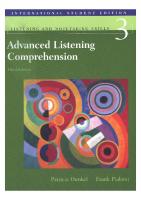
- Author / Uploaded
- Goodman Nelson
Credence, Credibility, Comprehension
Nelson Goodman The Journal of Philosophy, Vol. 76, No. 11, Seventy-Sixth Annual Meeting of the American Philosophical A
939 10 57KB
Pages 3 Page size 595 x 792 pts Year 2007
Recommend Papers
File loading please wait...
Citation preview
Credence, Credibility, Comprehension Nelson Goodman The Journal of Philosophy, Vol. 76, No. 11, Seventy-Sixth Annual Meeting of the American Philosophical Association, Eastern Division. (Nov., 1979), pp. 618-619. Stable URL: http://links.jstor.org/sici?sici=0022-362X%28197911%2976%3A11%3C618%3ACCC%3E2.0.CO%3B2-Z The Journal of Philosophy is currently published by Journal of Philosophy, Inc..
Your use of the JSTOR archive indicates your acceptance of JSTOR's Terms and Conditions of Use, available at http://www.jstor.org/about/terms.html. JSTOR's Terms and Conditions of Use provides, in part, that unless you have obtained prior permission, you may not download an entire issue of a journal or multiple copies of articles, and you may use content in the JSTOR archive only for your personal, non-commercial use. Please contact the publisher regarding any further use of this work. Publisher contact information may be obtained at http://www.jstor.org/journals/jphil.html. Each copy of any part of a JSTOR transmission must contain the same copyright notice that appears on the screen or printed page of such transmission.
JSTOR is an independent not-for-profit organization dedicated to and preserving a digital archive of scholarly journals. For more information regarding JSTOR, please contact [email protected].
http://www.jstor.org Fri May 18 08:42:44 2007
618
THE JOURNAL OF PHILOSOPHY
And if, as Goodman reminds us, art also serves cognitive functions, the reason for valuing the enlarged perception and conception that art provides is again the place of such perception and conception in our notion of human flourishing, of eudaemonia. T h e very term that Goodman chooses for the characteristic of the versions that meet our desiderata-rzghtnrss-is a term that bears its normative character on its face. Goodman himself toys with the idea of extending what he has to say to the moral domain i n a footnote on the first page of his concluding chapter. H e writes, "Any treatment of rightness may, of course, give rise to speculation concerning an application to moral rightness; but I willingly leave that to others. One point might be pondered, though: i n the present context at least, relativity of rightness and the admissibility of conflicting right renderings in no way precludes rigorous standards for distinguishing right from wrong." T h e direction that this footnote points out, however hesitantly, is the direction I think pl~ilosopherssympathetic to the general story Goodman tells should pursue. HILARY P U T N A M
Harvard University
T H E WONDERFUL WORLDS OF GOODMAN
*
T h e worldmaking urged by Goodman is elusive: Are worlds to be identified with (true) world-versions or do they rather comprise what is referred to by such versions? Various passages in his treatment suggest one answer, various passages another. T h a t versions are made is easy to accept; that the things they refer to are, equally, made, I find unacceptable. ISRAEL SCHEFFLEK
Harvard University
CREDENCE, CREDIBILITY, COMPREHENSION
*
T o most of Hilary Putnam's paper, I can say only "Bravo!" But I am not entirely i n accord with what he says about my discussion of truth and rightness. My suggestion that truth might be equated
* Abstract
of a paper to be presented in gn
lYays of Worldmaking, December 28, 1979.
.%PA
sylnposium on Goodman's
with permanent credibility depends upon recognizing that credibility is no more to be equated with belief than being retl is to be equated with looking red. W e often believe what is not credible and disbelieve what is credible. Standards o f credibility do not vary with individual opinion; the) are constant in the world o f worlds sketched in my book but may vary from one worltl o f world5 to another. And my argument that the arts must be taken no less seriously than the sciences i s not that the arts "enrich" us or contribute something warmer and more human, but that the sciences as distinguished from technology, and the arts as distinguished from fun, have as their common function the advancement ot untlerstanding. NELSON G O O D M X h
Harvard University
U N D E R S T A N D I N G N A T U R A L LANGUAGE
*
T
H E trouble with 'Artificial Intelligence is that computers don't give a damn-or so I will argue by considering the special case o f ~lnderstandingnatural language. Linguistic facility is an appropriate trial for A1 because inp~ltant1 output can be handled conveniently with a teletype, because understanding a text requires understanding its topic (which is unrestricted), and because there is the following test for success: tloes the text enable the candidate to answer those questions it would enable competent people to answer? T h e thesis will not be that (human-like)intelligence cannot be achieved artificially, but that there are itlentifiabie conditions on achieving it. This point is as much about language and understanding as about Artificial Intelligence. I will express it by distinguishing four tlifterent phenomena that can be called "holism": that is, four ways in which brief segments o f text cannot be understood "in isolation" or "on a one-by-one basis." * T o be presented at an APA symposium on Artificial Intelligence, December 28, 1979. C. Wade Savage and James 5foor will comment; see this JOURNAI., this issue, 633/4, for an abstract of 51oor's comment; Savage's paper is not available at this time. I am grateful for suggestions from Nuel Belnap, Bob Brandorn, Bert Drcyfus, Jay Garfield, and Zenon Pylyshyn. Kurt Baier helped with the German, and Genevieve Dreyfus with the French. 0022-362X/79/7611/0619$0l.40
0 1979 T h e Journal of Philosoph\. Inc.






